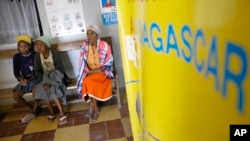JOHANNESBURG —
The already troubled African island of Madagascar faces a new and terrifying threat: bubonic plague. In recent years, the Indian Ocean nation has become the world's top site for the storied disease, with hundreds of cases and scored of plague deaths last year. Aid officials are warning that things could get worse unless more is done to prevent and fight the spread of the often-deadly disease.
Madagascar is the world’s hotspot for this flea-borne disease. It first gained infamy in the 14th century for killing some 25 million people in Europe. That epidemic earned the disease its ominous nickname, Black Death.
Last year, Madagascar saw more cases of bubonic plague than anywhere in the world, with 256 cases and 60 deaths. The International Committee of the Red Cross (ICRC) says that some 500 cases have been recorded on the island every year since 2009.
The ICRC this week announced a campaign with Malagasy authorities to eliminate flea-ridden disease-carrying rodents in a prison in the capital. Prisons in the nation are often overcrowded and dirty, making them ideal breeding grounds for disease.
Bubonic plague is rare in the modern era. But ICRC spokesman Jean-Yves Clémenzo says it persists in some pockets of the world, like Madagascar. He spoke to VOA from Geneva. “It’s not only Madagascar. You have still cases of plague in around 15 countries in the world, mainly the Democratic Republic of Congo, Madagascar and some South American countries," he stated. "It's mainly due to poor health conditions, poor infrastructure.”
Bubonic plague sounds terrifying because it is. Victims who are bitten by plague-infected fleas -- carried on rats -- often develop painful lymph-node swelling, flu-like symptoms and gangrene on their extremities. Without life-saving antibiotics, about two-thirds of those infected will die, according to the Centers for Disease Control. Medical officials say plague is not spread from person to person. But no vaccine is available.
Clémenzo said that it is vital to not hesitate if you are bitten by a flea and begin to experience symptoms. “So if you fear that you have plague, that you have bites on the body, what is important is to react very quickly, as the disease can spread and people can die in 24 hours. So it’s important to contact, to go to the [nearest] health facility or to contact the Institute Pasteur in Antananarivo and to act very, very, very quickly,” he explained.
Madagascar has had some severe problems recently. The cyclone-prone island has suffered recent tragedies of almost Biblical proportions, including a locust invasion, flooding and drought.
Those natural problems are exacerbated by the island’s decline in recent years. A 2009 coup has made the island increasingly isolated and aid officials say they have seen an economic decline since then.
Earlier this week, two U.N. agencies reported that as many as 4 million people in rural parts of the country are now food insecure because of a large-scale crop failure.
Madagascar is the world’s hotspot for this flea-borne disease. It first gained infamy in the 14th century for killing some 25 million people in Europe. That epidemic earned the disease its ominous nickname, Black Death.
Last year, Madagascar saw more cases of bubonic plague than anywhere in the world, with 256 cases and 60 deaths. The International Committee of the Red Cross (ICRC) says that some 500 cases have been recorded on the island every year since 2009.
The ICRC this week announced a campaign with Malagasy authorities to eliminate flea-ridden disease-carrying rodents in a prison in the capital. Prisons in the nation are often overcrowded and dirty, making them ideal breeding grounds for disease.
Bubonic plague is rare in the modern era. But ICRC spokesman Jean-Yves Clémenzo says it persists in some pockets of the world, like Madagascar. He spoke to VOA from Geneva. “It’s not only Madagascar. You have still cases of plague in around 15 countries in the world, mainly the Democratic Republic of Congo, Madagascar and some South American countries," he stated. "It's mainly due to poor health conditions, poor infrastructure.”
Bubonic plague sounds terrifying because it is. Victims who are bitten by plague-infected fleas -- carried on rats -- often develop painful lymph-node swelling, flu-like symptoms and gangrene on their extremities. Without life-saving antibiotics, about two-thirds of those infected will die, according to the Centers for Disease Control. Medical officials say plague is not spread from person to person. But no vaccine is available.
Clémenzo said that it is vital to not hesitate if you are bitten by a flea and begin to experience symptoms. “So if you fear that you have plague, that you have bites on the body, what is important is to react very quickly, as the disease can spread and people can die in 24 hours. So it’s important to contact, to go to the [nearest] health facility or to contact the Institute Pasteur in Antananarivo and to act very, very, very quickly,” he explained.
Madagascar has had some severe problems recently. The cyclone-prone island has suffered recent tragedies of almost Biblical proportions, including a locust invasion, flooding and drought.
Those natural problems are exacerbated by the island’s decline in recent years. A 2009 coup has made the island increasingly isolated and aid officials say they have seen an economic decline since then.
Earlier this week, two U.N. agencies reported that as many as 4 million people in rural parts of the country are now food insecure because of a large-scale crop failure.









